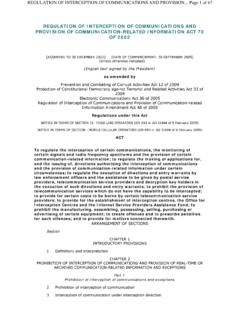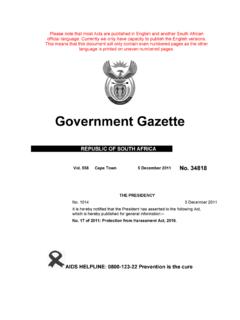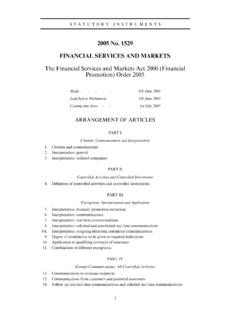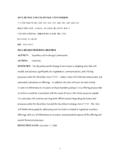Transcription of Key considerations in telecommunications …
1 Ellipsis regulatory solutions 2009 1 of 21 pages Key considerations in telecommunications regulation: An overview of the South African position prepared by Dominic Cull, Ellipsis Regulatory Solutions, December 2009 ellipsis regulatory solutions 2009 2 of 21 pages Content Introduction .. 4 Legislative Framework in South Africa .. 5 Role-players .. 7 Department of Communications .. 7 Independent Communications Authority of South Africa .. 7 Universal Service and Access Agency of South Africa .. 7 Portfolio Committee on Communications .. 7 Competition Authorities .. 7 Incumbents .. 8 State-owned Enterprises .. 8 New entrants .. 8 Policy .. 9 National Broadband Policy .. 9 National Radio Frequency Spectrum Policy.
2 9 Local and Digital Content Development Strategy .. 9 electronic Communications Licensing .. 10 Why are there licensing requirements? .. 10 When is a licence required? .. 10 Service licensing framework in South Africa .. 10 Licence exemptions .. 11 Control and ownership of licences .. 13 Infrastructure .. 13 Access .. 14 Local Loop Unbundling (LLU).. 15 Carrier Select and Carrier Preselect .. 15 Consumer Protection .. 16 Code of Conduct Regulations .. 16 End-user and Subscriber Service Charter Regulations .. 16 Code of Conduct for People with Disabilities .. 16 Code of Conduct relating to Subscriber Equipment .. 16 Price controls .. 17 Radio Frequency Spectrum .. 18 Allocation vs. Assignment .. 18 Licence-exempt frequency .. 18 Spectrum licence fees.
3 19 Spectrum liberalisation .. 19 Numbering .. 20 ellipsis regulatory solutions 2009 3 of 21 pages Number portability .. 20 Film and Publications Board (FPB) .. 21 Registration .. 21 Child pornography and the child pornography hotline .. 21 Interception and Monitoring .. 22 Customer registration .. 22 Assisting with investigations .. 22 ellipsis regulatory solutions 2009 4 of 21 pages Introduction telecommunications regulation is a vastly complex area of expertise and is most properly left to those who have adopted it as a speciality. Nevertheless a working knowledge of regulatory issues is critical for managers in telecommunications companies and customers of such companies. In particular, awareness of consumer rights or obligations and an understanding of the regulatory framework for interconnection and facilities leasing will be critical in negotiating agreements and service levels for the provision of electronic communications services.
4 Ellipsis regulatory solutions 2009 5 of 21 pages Legislative Framework in South Africa The primary Act of Parliament regulating the electronic communications industry in South Africa is the electronic Communications Act 36 of 2005 ( the ECA ), which replaced the telecommunications Act of 1996 ( the telecommunications Act ) on the 19th July 2006. The ECA can be characterised as pro-competitive legislation in stark contrast to the telecommunications Act, which was protectionist in that it sought to protect the incumbent fixed line provider, Telkom SA Ltd, from the effects of competition. The ECA covers a wide range of issues, including: licensing, access, infrastructure rights such as way-leaves, the management and assignment of frequency markets and competition, and universal service.
5 The ECA is convergence legislation which takes into account the blurring between broadcasting and telecommunications in particular. Other legislation which impacts upon the sector includes: the Regulation of Interception of Communications and Provision of communication -related Information Act 70 of 2002 ( RICA ); the Competition Act 89 of 1998 ( the Competition Act ); the Film and Publications Act 65 of 1996 ( the Film and Publications Act ); the ICASA Act 13 of 2000 ( the ICASA Act ); the Broadcasting Act 4 of 1999 ( the Broadcasting Act ); and the electronic Communications and Transactions Act 25 of 2002 ( the ECT Act ). The Protection of Personal Information Bill 9 of 2009 was recently introduced to the South African Parliament and is intended to regulate comprehensively the use and management of personal information within the digital environment.
6 Links: ECA RICA Competition Act - Film & Publications Act ellipsis regulatory solutions 2009 6 of 21 pages ICASA Act - Broadcasting Act - ECT Act Protection of Personal Information Bill ellipsis regulatory solutions 2009 7 of 21 pages Role-players Department of Communications The Department of Communications (DoC) is responsible for setting electronic communications policy, overseeing radio frequency spectrum and representing South Africa in international fora such as the International telecommunications Union (ITU). Independent Communications Authority of South Africa The Independent Communications Authority of South Africa (ICASA) is the independent communications regulator, set up and governed by the ICASA Act.
7 The establishment of an independent regulator is a consequence of South Africa s membership of the World Trade Organisation (WTO) and its accession to the Reference Paper to the Fourth Protocol on Basic telecommunications which sets out requirements for signatories regulatory environments. Universal Service and Access Agency of South Africa The Universal Service and Access Agency of South Africa (USAASA) was established under the ECA to promote the goals of universal access and universal service in the under serviced areas of South Africa. Licensees are required to contribute to the Universal Service and Access Fund (USAF) which is intended for use in incentivising and subsidising the roll-out of electronic communications networks in under-serviced areas.
8 Portfolio Committee on Communications The Parliamentary Portfolio Committee on Communications (PPCC) exercises oversight over the above three entities. It has powers to conduct inquiries and subpoena documents. Competition Authorities ICASA is generally regarded as having ex ante regulatory powers, it acts so as to prevent future anti-competitive conduct. Ex post regulation responding to specific complaints or instances of anti-competitive conduct is the province of the Competition Commission and Competition Tribunal under the Competition Act. ellipsis regulatory solutions 2009 8 of 21 pages ICASA and the Competition Commission act under a Memorandum of Agreement but jurisdictional difficulties have meant that the Commission has not as yet managed to act effectively against incumbents in respect of conduct which breaches the provisions of the Competition Act.
9 Incumbents In South Africa the incumbents are regarded as Telkom (fixed line) and Vodacom and MTN (mobile). A second tier of incumbent operators would include Neotel, Cell C and iBurst. The general interest of the first tier is the preservation of the status quo which favours them due to economies of scale and control of network infrastructure. These players generally seek to delay regulatory processes designed to stimulate competition. State-owned Enterprises The South African Government has taken policy decisions to intervene in the provision of electronic communications facilities where it is of the view that there is market failure. Broadband Infraco recently received an IECNS licence and will be providing national long-distance and international cable services at prices based on a cost plus basis.
10 Sentech is the national signal distributor and has been earmarked for the development of a national wireless backbone using WiMAX technology. New entrants The regulatory landscape in South Africa received a significant jolt in January 2009 when ICASA issued infrastructure licences equivalent to those held by the incumbent - to some 543 value added network operators. Many of these are seeking to become telco competitors to the incumbents and therefore have an interest in the speedy and effective implementation of the regulatory framework set out in the ECA. ellipsis regulatory solutions 2009 9 of 21 pages Policy As noted above the setting of policy with regard to electronic communications is a competency held by the South African Government through the Department of Communications (DoC).
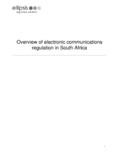

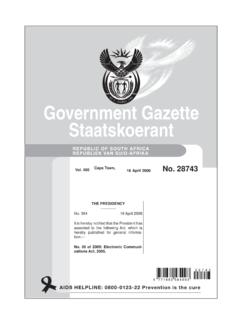
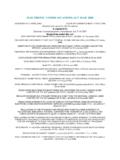
![Electronic Communications Act [No. 36 of 2005]](/cache/preview/e/3/c/f/7/4/b/3/thumb-e3cf74b35a7a23f0835edd9e65295301.jpg)
